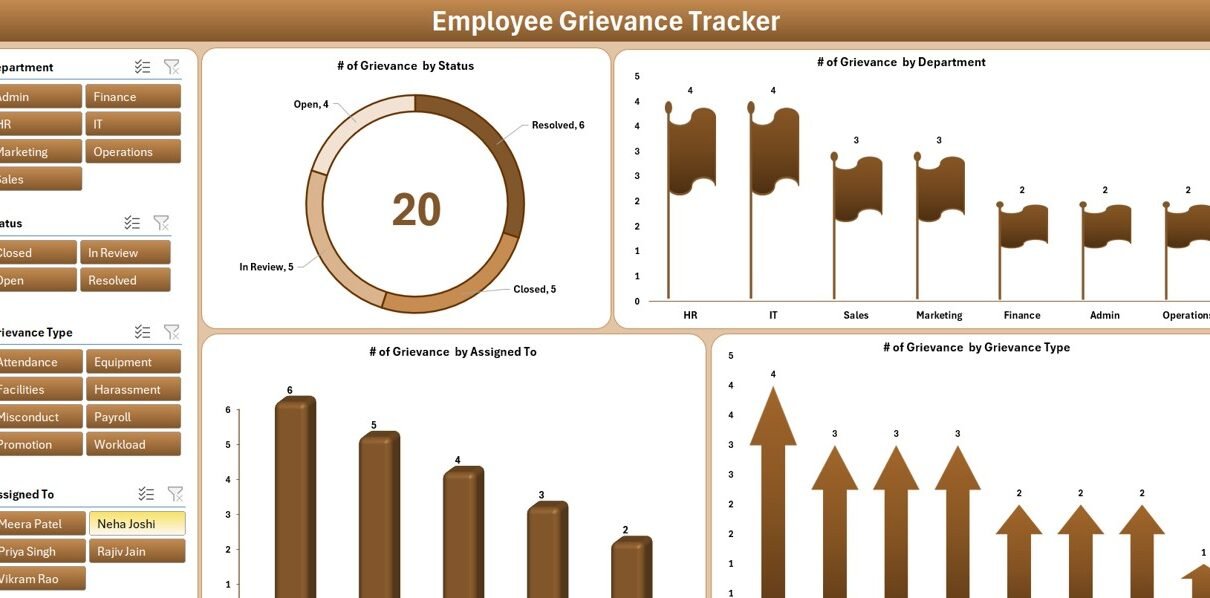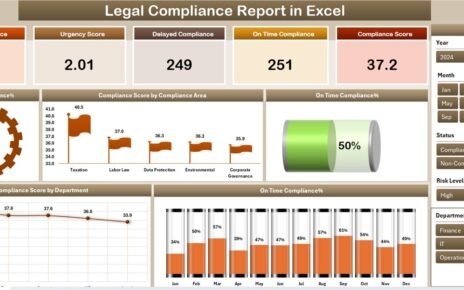In every organization, employee satisfaction plays a crucial role in productivity and long-term success. But no matter how great your work culture is, grievances are inevitable. What matters most is how you handle them—and that’s where the Employee Grievance Tracker in Excel comes in.
This powerful tool, built using Excel and VBA, offers a simple yet effective way to track, manage, and resolve employee grievances in a timely and transparent manner. Whether you’re an HR manager, supervisor, or small business owner, this solution will help you stay organized, maintain accountability, and ensure employees feel heard.
Click to Purchases Employee Grievance Tracker in Excel
What Is an Employee Grievance Tracker in Excel?
An Employee Grievance Tracker in Excel is a ready-to-use tool that allows HR departments to record, monitor, and address employee complaints and concerns in a structured format.
Built using Excel and enhanced with VBA-powered forms, this tracker includes data entry forms, dashboards, login systems, and management panels to simplify the entire process of grievance tracking.
Why Use Excel for Grievance Tracking?
You might wonder: Why use Excel when there are fancy HR software tools available? The answer is simple:
-
Excel is accessible – Most companies already have it.
-
Easy to customize – You can tailor the sheet to your company’s needs.
-
No recurring cost – It’s a one-time setup.
-
Visual and analytical – With charts and pivot tables, insights are at your fingertips.
So instead of juggling multiple apps or paperwork, Excel gives you everything in one place—without the headache.
Key Features of the Employee Grievance Tracker in Excel
Let’s break down all the amazing features that come packed into this smart Excel-based solution:
Login Form

-
Simple and secure login system.
-
Predefined credentials like
User ID: Admin1andPassword: abcd. -
Login form leads directly to the main control panel.
Main Form (Grievance Management Console)

-
This is your central hub.
-
From here, you can view, add, edit, or delete employee grievances.
-
It’s clean, easy to navigate, and beginner-friendly.
Click to Purchases Employee Grievance Tracker in Excel
Dashboard Sheet Tab

-
Visually engaging dashboard with 4 interactive slicers.
Dynamic charts for quick insights:
- Grievances by Status (Doughnut chart)
- Grievances by Department (Bar chart)
- Grievances by Assigned To (Column chart)
- Grievances by Type (Pie chart)
Data Entry Sheet

-
Core table to manage all grievance data.
Columns include:
- ID, Employee ID, Name, Department, Designation
- Date of Submission, Grievance Type, Description
- Status, Assigned To, Resolution Date, and Remarks
Top panel includes:
Add New Record

Opens the data entry form
Update Record

Edit existing entries with pre-filled forms
- Delete Record – Remove entries with confirmation
Manage List Sheet Tab

Customizable dropdowns:
- Departments
- Grievance Types
- Status options
- Assigned To
-
Easy to maintain through Add/Delete buttons
Support Sheet Tab

-
Houses backend pivot tables and chart data
-
No user input required—can be hidden for simplicity
User Management Panel

-
Accessible via a top menu button
-
Add, edit, delete users or reset/change passwords
-
Ideal for multi-user access and role control
Settings Sheet (Optional)

-
Advanced configuration options
-
Can be used to manage form behavior or dropdown defaults
Multiple User Logins
-
Switch accounts easily
-
Helps maintain accountability and access control
Click to Purchases Employee Grievance Tracker in Excel
Advantages of the Employee Grievance Tracker in Excel
Using this Excel-based tracker can bring several tangible benefits:
✅ Centralized Information
All data is recorded in one structured file, accessible at any time.
✅ Real-time Updates
The dashboard and pivot tables refresh automatically when new data is added or updated.
✅ Saves Time and Effort
No more manual tracking or disorganized emails—use buttons and forms to manage everything.
✅ Cost-Effective
No need for expensive HR software—Excel already lives in your system.
✅ Improves Transparency
Employees and HR teams can maintain clarity with real-time grievance status tracking.
Best Practices for Using the Grievance Tracker
To make the most of your Employee Grievance Tracker, follow these best practices:
1. Define Clear Grievance Categories
Set specific types like Workplace Harassment, Salary Disputes, or Policy Violations to simplify classification.
2. Keep Your Lists Updated
Regularly review and update the dropdown lists (departments, grievance types, etc.).
3. Set SLA (Service-Level Agreement)
Define acceptable resolution timelines based on grievance types.
4. Train HR Personnel
Ensure team members understand how to use the tool effectively—especially login, data entry, and status updates.
5. Restrict Unauthorized Access
Utilize login credentials and hide the backend (support) sheets to prevent accidental modifications.
6. Review Dashboard Weekly
Monitor patterns or frequent grievances to identify workplace issues early.
How to Use the Grievance Tracker: Step-by-Step
Here’s a simple workflow you can follow to use the tracker effectively:
-
Login to the Tool
Enter your credentials to access the main form. -
Submit a New Grievance
Click Add New Record → Fill the form → Hit Submit. -
Edit or Update a Grievance
Select the record by ID → Click Update Record → Edit → Submit. -
Delete a Grievance
Select the record → Click Delete Record → Confirm. -
View the Dashboard
Go to the Dashboard sheet → Use slicers to filter data. -
Manage Dropdowns
Use the Manage List sheet to update departments, grievance types, and assigned personnel. -
Track Performance
Analyze data using charts and pivot summaries in the dashboard.
Real-Life Use Cases of the Grievance Tracker
Here are a few situations where this tracker becomes a powerful HR asset:
-
A manufacturing company tracks safety-related grievances by site.
-
An IT firm categorizes grievances by project teams to identify workload imbalances.
-
An NGO monitors harassment complaints and ensures timely resolutions.
-
A school uses it to handle teaching staff and non-teaching staff issues separately.
Data Privacy and Security Tips
Handling grievances requires confidentiality. Here are some data protection measures:
-
Protect the Excel file with a password.
-
Limit file access to authorized HR staff.
-
Store backups in a secured cloud location or encrypted drives.
-
Regularly update passwords to prevent unauthorized access.
Bonus Tip: Customize for Your Organization
Although this tracker is fully functional out of the box, you can tweak it based on your needs:
-
Add new fields like “Urgency Level” or “Follow-up Required”.
-
Insert conditional formatting to highlight overdue items.
-
Create department-wise dashboards on separate sheets.
Conclusion
An Employee Grievance Tracker in Excel is more than just a spreadsheet—it’s a complete HR solution to maintain fairness, improve communication, and boost employee morale.
You no longer need to rely on cluttered emails or memory to manage grievances. With this simple yet powerful tracker, you can take your grievance redressal process to the next level—without investing in expensive tools.
Whether you’re an HR veteran or just starting your journey, this tool can streamline grievance tracking, ensure transparency, and foster a more engaged workforce.
Frequently Asked Questions (FAQs)
1. Is this Employee Grievance Tracker suitable for small businesses?
Yes, it’s perfect for small businesses because it’s low-cost, easy to use, and doesn’t require any special software.
2. Can I modify the tracker to add more columns or charts?
Absolutely! Since it’s built in Excel, you can customize it to match your organization’s unique requirements.
3. Is there a limit to the number of grievance records I can store?
No. You can store thousands of records, depending on Excel’s capacity (which supports up to 1 million rows per sheet).
4. Is it secure enough to store confidential employee complaints?
Yes. You can password-protect the file, restrict user access, and hide sensitive sheets to maintain confidentiality.
5. Can multiple users access the tool?
Yes, especially if stored on a shared drive. However, simultaneous editing requires Excel Online or SharePoint for real-time collaboration.
6. Do I need to know VBA to use it?
Not at all. The VBA coding runs behind the scenes. All you need to do is click buttons and fill out forms.
Visit our YouTube channel to learn step-by-step video tutorials
Click to Purchases Employee Grievance Tracker in Excel



